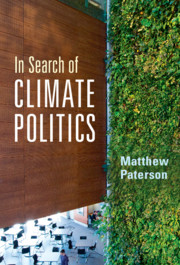Book contents
- In Search of Climate Politics
- In Search of Climate Politics
- Copyright page
- Contents
- Figures and Tables
- Contributors
- Preface
- Acknowledgements
- Acronyms
- 1 Introduction
- 2 In Search of Climate Politics
- 3 Making Climate Policy in the City of Ottawa
- 4 Networked Governance and Carbon Accounting in Ottawa
- 5 Complete Streets and Its Discontents
- 6 Intensifying Conflicts
- 7 Mapping Climate Experimentation in Ottawa
- 8 The University of Ottawa
- 9 Renewing Democratic Politics
- 10 Conclusions
- References
- Index
10 - Conclusions
Published online by Cambridge University Press: 02 November 2021
- In Search of Climate Politics
- In Search of Climate Politics
- Copyright page
- Contents
- Figures and Tables
- Contributors
- Preface
- Acknowledgements
- Acronyms
- 1 Introduction
- 2 In Search of Climate Politics
- 3 Making Climate Policy in the City of Ottawa
- 4 Networked Governance and Carbon Accounting in Ottawa
- 5 Complete Streets and Its Discontents
- 6 Intensifying Conflicts
- 7 Mapping Climate Experimentation in Ottawa
- 8 The University of Ottawa
- 9 Renewing Democratic Politics
- 10 Conclusions
- References
- Index
Summary
While I was finalizing the first draft of this book, in early 2019, the world saw an upsurge in radical protest activity over climate change. Extinction Rebellion, centred on the UK but spreading, the school strikes for climate initiated by Greta Thunberg but now occurring worldwide, the Sunrise Movement in the US, declarations of ‘climate emergency’ by municipalities worldwide and some national governments, and the radicalized vision of climate change (at least relative to previous incarnations) embodied in the Green New Deal (GND): All have repoliticized climate change in the terms I have been discussing, by bringing climate change squarely into the realm of public collective decision-making, articulating their activism as opposition to powerful forces destroying the climate, and emphasizing the conflictual qualities of climate change. This is of course against a background of recurrent activism that has similarly repoliticized climate change: At the United Nations Framework Convention on Climate Change (UNFCCC) Conferences of the Parties from the Hague in 2001 onwards; in organizations such as Plane Stupid and Climate Camp; over oil pipelines in Western Canada and elsewhere, coalmines in Australia, fracking in many places; over divestment from fossil fuels in universities and churches; and in new coalitions in international climate negotiations led by radical governments in Bolivia and Ecuador.
- Type
- Chapter
- Information
- In Search of Climate Politics , pp. 145 - 160Publisher: Cambridge University PressPrint publication year: 2021



